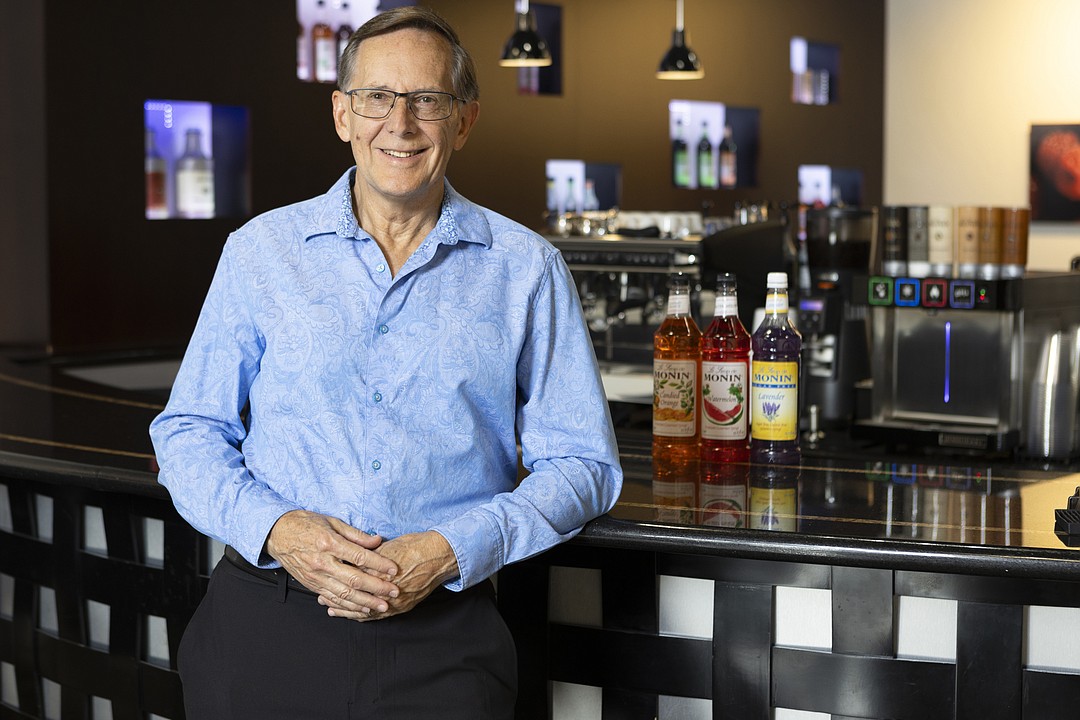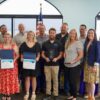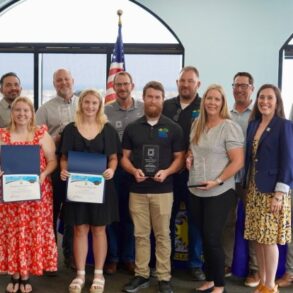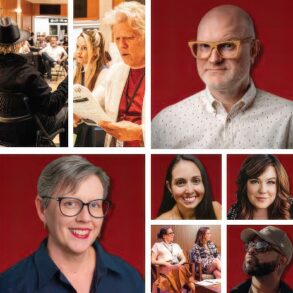
Tucked away in an industrial part of Clearwater is an unsuspecting behemoth of a company. Monin, a beverage flavoring company known for its syrups and liqueurs founded in France over 100 years ago, has been churning out millions of bottles of product since 1996.
Leading this bevy of beverage products is CEO Bill Lombardo, who joined the business in 1999 to help guide the brand on unfamiliar turf. It now does some $300 million a year in revenue.
How did a European brand decide to plant its first headquarters in North America in a little coastal town? Lombardo says there are two versions of the story: both involve sugar.
Citing the gray days of winter in France, Lombardo recalls, “It’s sort of like Pittsburgh, or Erie, or Cleveland during the winter. So [leadership] came here on vacation, and they said, ‘this is beautiful here during the winter, but maybe we should just set up distribution here, this would be a good place to start.’”
Apart from the sugar white beaches of the Gulf, the proximity to actual sugar was another perk.
“The other story is we’re in very close proximity to sugar processing in this country. The biggest sugar cane growing is right here in the Everglades,” Lombardo says, “Having that source close by is advantageous. It gives us a solid supply chain and it gives us pretty favorable pricing because obviously someone has to pay the freight. But I’d say that the first story I think is really the story.”
Lombardo was working in the food and beverage industry in France when he came into Monin’s orbit. He was offered the role of CEO of Monin Americas and is now entering year No. 25.
“I’d say the biggest challenge when I came here was that Monin was very small, but almost all the competitors were also very small. And the market itself was just very narrow. Especially the coffee.” he recalls.
Lombardo, whose previous experience includes Olive Garden and Planet Hollywood Worldwide, has flourished at the private company. So much so he was recently one of nine executives to win the EY Entrepreneur of the Year Award for Florida, presented by international accounting giant Ernst & Young.
“I came from a couple of different large public companies. And the benefit of having a family company is that you can do a lot more for your employees than you can do in a public company,” says Lombardo about the company’s success and his role in helping to shape it. “The answer is being able to develop people, to mentor and give people the opportunity to grow. And that to me, that’s the most exciting part of the job.”
Control your destiny
One such example of an employee that has risen through the ranks under Lombardo’s guidance is Sabrina Godfrey. She was already familiar with Monin products through her serving job at Smokey Bones in Clearwater. Although she didn’t know her proximity to the headquarters, she impressed Lombardo with her personality and knowledge of the product when she served his table lunch in 2013.
“I said [to her], ‘Is this your destiny? Do you want to just be a server?’ And she goes, ‘No, absolutely not.’ I said, ‘Well, that’s good, because I think you’ve got a lot more potential. So come out and we interviewed her and we gave her a job,” Lombardo recalls fondly.
Godfrey worked her way up from customer service, to the innovation department, to leading a team of four as director of marketing communications which manages all the marketing communications for the U.S., Latin America and Canada markets.
“I know it sounds a little bit cliche when people say, ‘Oh, we have a family culture,’ but at Monin it truly is run as a family business. So you’re never a member, you’re always a person,” Godfrey says, “Bill is accessible, and [he] is communicating all the time. We’re all kind of rowing in the same direction. I think he’s a fantastic leader. Very trustworthy and never steered us wrong.”
Best Practices
Beyond caring for those that manage the products is considering care for the product itself. In 2018, Monin began its Clean Label initiative. Monin defines “clean label” on its website as “free from extra additives” including artificial ingredients and synthetic materials. Lombardo told Forbes in a 2023 interview that Monin is not 100% clean label, but are “very, very close to a hundred.”
“Personally, that’s a big deal for me,” says Lombardo, “I’ve always looked at food and said, you know, what you’re gonna put in your body should be something that probably was grown correctly and came out of the ground. And so that helps me kind of drive the whole thought process here, when we look at things that are minimally processed.”
In 2020, Monin began calculating its carbon footprint, with a goal of cutting greenhouse gas emissions in half by 2030.
“One of the things we’ve started to do in the last five years is go backwards into the supply chain,” Lombardo adds.
Most of the world’s supply of vanilla comes from Madagascar, which takes multiple days and modes of transportation to get to, so Monin is currently partnering with the University of Florida’s agricultural program to develop a vanilla hybrid that can grow successfully in Florida.
Bubbling Up
Today, Monin is expanding in all directions under Lombardo’s leadership. A second plant opened in Sparks, Nevada in 2021. “Our single largest customer state is California. So, we’re sitting here in Florida, and we actually have more volume going to California than we have in Florida, so it makes sense to have something on the West Coast,” Lombardo says. The Nevada facility distributes to 11 western states and there are now talks of a potential third plant.
There are 355 employees between the two plants, and warehouses and distribution centers from coast to coast. The Clearwater headquarters is building an addition due to running out of space for storage and raw product.
“The truth is our product is a very interesting product because it applies to virtually everything,” says Lombardo. Recipes for cocktails, mocktails, lattes and sauces in restaurants and cafes all over the world contain Monin flavoring. Now the innovation team is working on food recipes and Lombardo’s projections anticipate the business will double in five years.
“People are looking for more flavor, more color, more naturalness. We’re very well positioned to continue to grow, because we are not only growing by expanding the market and beverage, but now expanding the market in food. And when you start to look at food use, it’s even more volume dramatic. So what excites me is the fact that we’re just getting started.”
This post was originally published on this site be sure to check out more of their content







